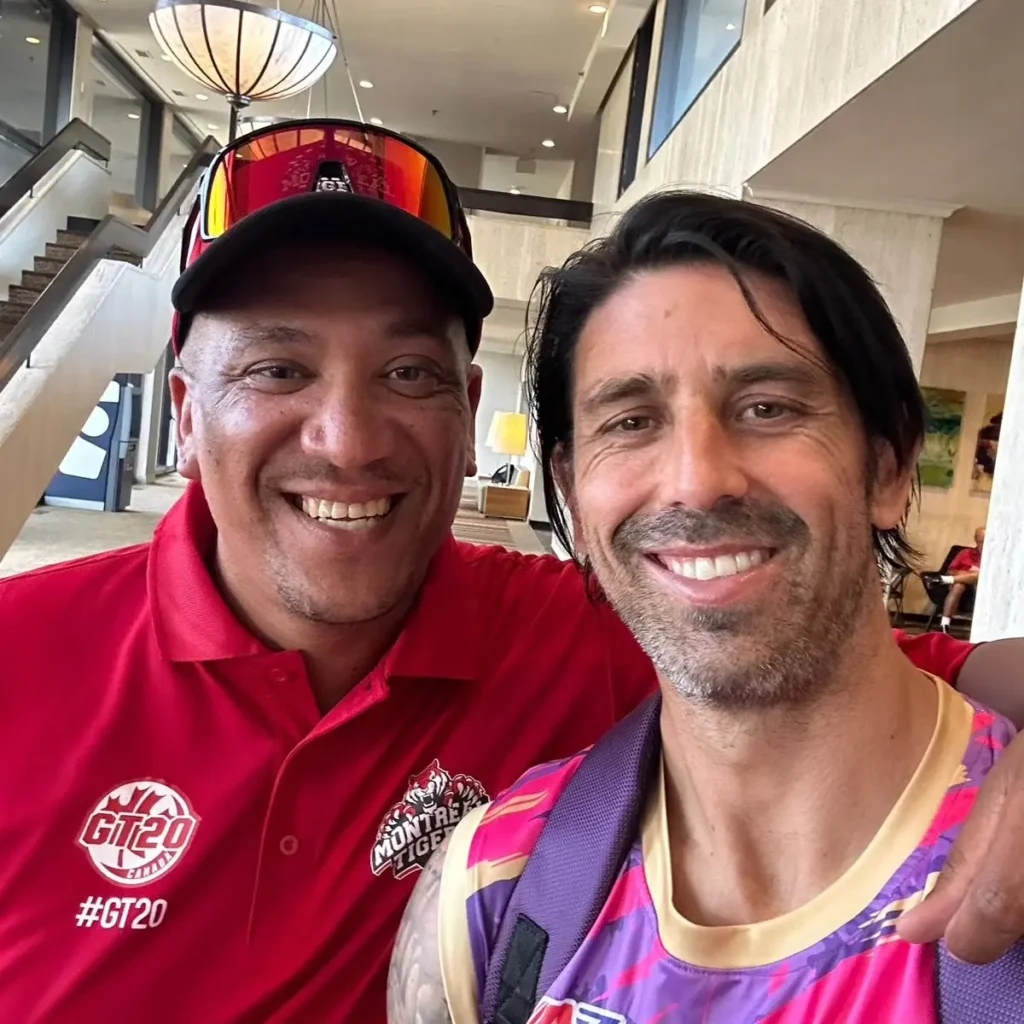From Field to Future: Reeze Telling’s Cricketing Odyssey

Born on February 8, 1984, in Port Elizabeth, South Africa, Reeze Telling’s cricketing journey is a remarkable tale of resilience, transformation, and passion for the game. Once celebrated for his cricketing prowess during his playing days, Reeze has since transitioned into a successful coaching career, earning respect and admiration along the way. His Cricinfo profile encapsulates his professional cricketing history, but his journey extends far beyond his playing career. Reeze has moved from the cricket fields of South Africa to the forefront of Canadian cricket, where he now serves as the Head Coach of the Nova Scotia Cricket Association. Most recently, he added another feather to his cap by serving as the Assistant Coach of the Montreal Tigers, who finished as runners-up in the Global T20 Canada 2024 under the legendary coach Dave Whatmore.
A Tough Transition
Reeze’s journey from being a promising cricketer to becoming a successful coach was filled with hurdles and hard choices. He vividly recalls the moments of doubt and the difficult decisions he had to make along the way. “Transitioning from player to coach wasn’t an easy decision,” Reeze reflects. “The key turning points were the injuries that cut my playing career short. I realized that my passion for cricket could be channeled into coaching, where I could shape young players and share my experience. The support I received from mentors during this transition was invaluable and confirmed that coaching was the right path for me.” This transition was not merely about changing roles; it was about embracing a new identity, learning new skills, and finding fulfillment in guiding the next generation of cricketers.
Shaping His Coaching Philosophy
Reeze’s experiences on the field, both triumphant and challenging, have deeply influenced his coaching philosophy, which goes beyond the technical aspects of the game. His approach is holistic, focusing on the mental and emotional well-being of his players, as well as their physical abilities. “The ups and downs of my career have taught me resilience and the importance of mental strength,” he explains, emphasizing that cricket is as much a mental game as it is a physical one. “My approach to coaching is not just about developing technical skills but also about instilling mental fortitude in players. I encourage players to embrace challenges and view setbacks as learning opportunities. Understanding the emotional side of the game allows me to better support players in their development.” For Reeze, coaching is not just about winning matches; it’s about building character, teaching life skills, and preparing players for the challenges both on and off the field.
The Making of a Successful Coach

Patience, communication, and adaptability are qualities that Reeze believes are essential for any successful cricket coach. But these qualities didn’t come to him overnight; they were honed through years of experience, both as a player and as a coach. “I strive to embody these qualities by maintaining open communication with players, being patient with their progress, and adapting my coaching methods to meet the individual needs of each player,” Reeze shares. He understands that each player is unique, with their own strengths, weaknesses, and learning curves. “Understanding that each player has a unique path is crucial to their development. As a coach, it’s my responsibility to guide them along that path, helping them overcome obstacles and achieve their full potential.” This individualized approach has not only earned him respect as a coach but also helped him build strong, trusting relationships with his players.
Nova Scotia Cricket’s Growth
Under Reeze’s leadership, the Nova Scotia Cricket Association has experienced remarkable growth and development. His strategic vision and commitment to grassroots cricket have been pivotal in this transformation. “The Nova Scotia Cricket Association has been instrumental in promoting cricket at the grassroots level, particularly by endorsing the Eastern Cricket Academy, which plays a key role in developing young talent,” Reeze notes with pride. The association’s efforts have led to significant milestones, including the acquisition of new fields, the addition of another club, and the introduction of a 4th division to the league. “The recent addition of a new indoor training facility has us optimistic about further elevating the standard of cricket in the region. These developments are just the beginning, and we’re committed to building a strong cricketing infrastructure that will serve future generations.” Reeze’s impact on Nova Scotia cricket is evident not just in the success of its teams, but in the growing enthusiasm and participation in the sport throughout the region.
Identifying and Nurturing Talent
Identifying and nurturing talent is at the core of Reeze’s coaching philosophy. He spends countless hours observing local league matches, identifying promising players, and designing specialized training programs tailored to their needs. “Although there is no school cricket, the Academy has created opportunities for young talent to represent other provinces in national tournaments,” Reeze explains. “This gives them the chance to be noticed by national selectors and ensures a clear pathway to higher levels of competition.” His dedication to nurturing young talent is evident in the success stories emerging from the Eastern Cricket Academy, where many players have gone on to represent higher levels of competition. “We’re not just training cricketers; we’re building future stars. My goal is to provide these players with the skills, confidence, and opportunities they need to succeed.” Reeze’s commitment to developing talent is not just about winning games; it’s about shaping the future of Canadian cricket.
Challenges in Nova Scotia Cricket
Despite the progress, cricket development in Nova Scotia is not without its challenges. The region faces unique hurdles, such as limited facilities, harsh weather conditions, and a lack of exposure compared to more mainstream sports. “The association is addressing these by lobbying for better infrastructure, organizing indoor training sessions during the off-season, and increasing media coverage to attract more interest in the sport,” Reeze outlines. “We’re also working on partnerships with schools and local businesses to secure funding and support. It’s a long road, but with persistence and community support, we believe we can overcome these challenges.” Reeze remains optimistic and determined, seeing these challenges not as obstacles, but as opportunities to innovate and grow the sport in the region. “Every challenge we face is an opportunity to prove our resilience and creativity. We’re building something special here, and the support from the community has been incredible.”
The Impact of GT20

The Global T20 Canada league has rapidly gained popularity, and Reeze sees it as a vital contributor to the growth of cricket in the country. His involvement with the Montreal Tigers has given him first-hand experience of the league’s impact on Canadian cricket. “The GT20 league has the potential to significantly boost cricket’s profile in Canada,” Reeze asserts. “It offers Canadian players a platform to showcase their talent alongside international stars, which can inspire the next generation. The league also brings much-needed visibility to the sport, attracting fans and sponsors, which will contribute to the overall growth of cricket in the country.” The exposure and experience that Canadian players gain from participating in the GT20 league are invaluable, providing them with the opportunity to compete at a high level and learn from some of the best players in the world.

Coaching in T20
Coaching in the T20 format presents unique challenges and opportunities, according to Reeze. The fast-paced nature of the game requires coaches to think on their feet and make quick decisions. “T20 cricket requires quick decision-making and adaptability,” Reeze explains. “The challenge is to prepare players to be aggressive and flexible while maintaining their composure under pressure. The opportunity lies in the format’s appeal to a younger audience and its potential to introduce innovative strategies and tactics.” Reeze embraces these challenges, seeing them as an opportunity to push the boundaries of traditional cricket coaching and explore new approaches to the game. “Coaching in T20 is about striking the right balance between aggression and control. It’s a format that tests both the players and the coaches, and that’s what makes it so exciting.”
Balancing Multiple Roles
Balancing his roles as Head Coach in Nova Scotia and Assistant Coach for the Montreal Tigers has required Reeze to master the art of time management and delegation. “While I don’t have extra coaching staff, I’ve leveraged personal connections to bring in specialized trainers for a holistic approach, integrating strength and conditioning with skills development,” says Reeze. His ability to manage these roles effectively is a testament to his organizational skills and dedication to the sport. “Regular communication with these trainers and senior players ensures that everything runs smoothly in my absence,” he adds. The experience and knowledge he has gained from coaching at the professional level with the Montreal Tigers are invaluable assets that he brings back to Nova Scotia, enriching the local cricket scene. “Balancing these roles is challenging, but it’s also incredibly rewarding. The exchange of ideas and experiences between different teams and environments helps me grow as a coach and brings new perspectives to my work.”Balancing the pressures of coaching with his personal life, especially as a parent, is a challenge that Reeze takes seriously. “Balancing coaching and personal life requires clear boundaries and time management. I make it a point to be present with my family when I’m not on duty, especially with my kids. Prioritizing family time and ensuring I recharge mentally helps me stay effective as a coach. The support from my family is crucial—they understand the demands of my profession, and their encouragement keeps me grounded.”
Read More Cricket Related News on CricFLick!



